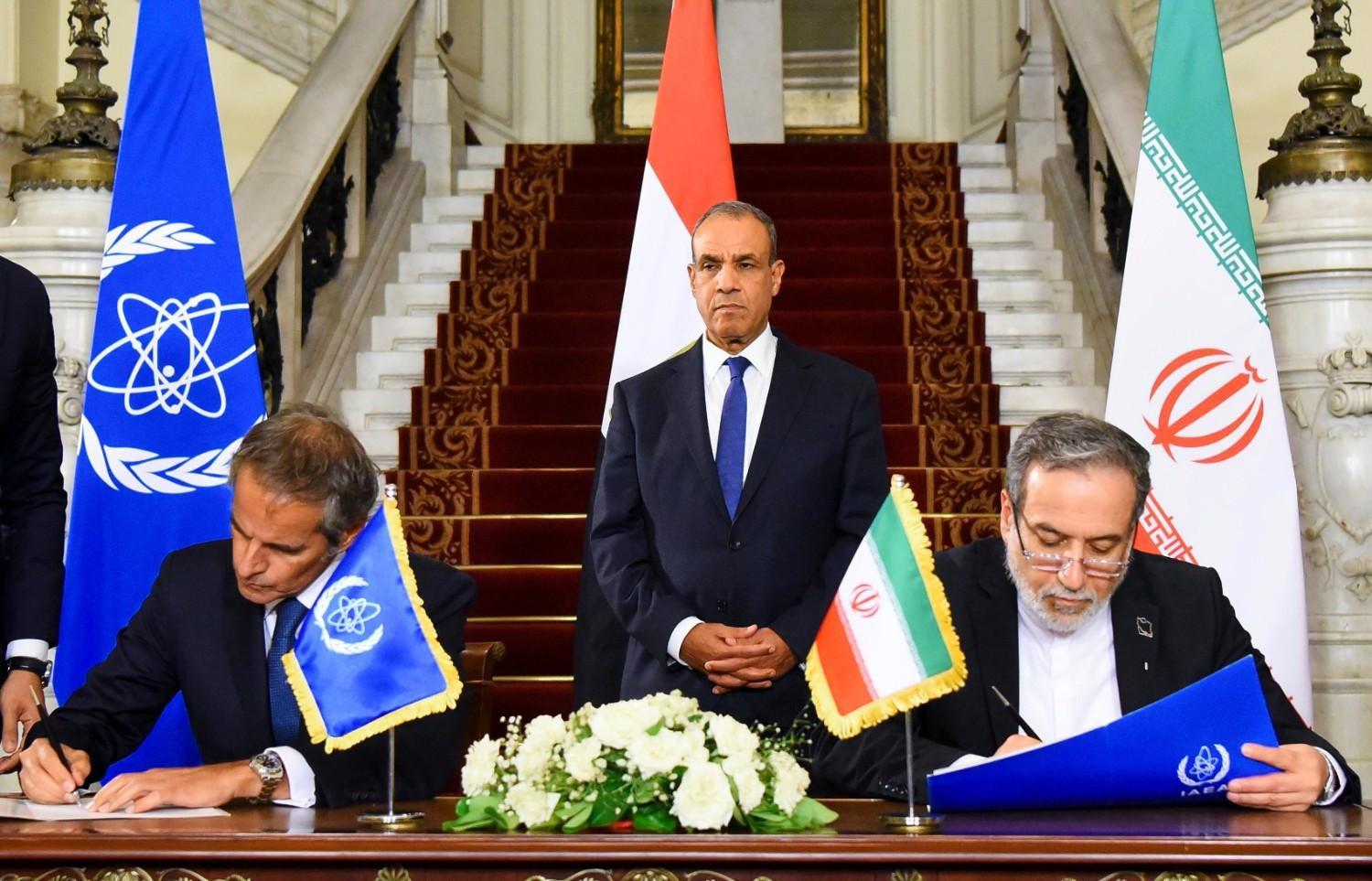
In this handout photo released by Egyptian Foreign Ministry Press Service, Iranian Foreign Minister Abbas Araghchi, right, and Director General of the International Atomic Energy Agency (IAEA) Rafael Grossi, left, an sign an agreement to open the way for resuming cooperation, at Tahrir Palace in Cairo, Egypt, Tuesday, Sept. 9, 2025. (Egyptian Foreign Ministry Press Service via AP)
Iran is withholding access to U.N. nuclear inspectors, Foreign Minister Abbas Araghchi said in an interview aired Wednesday, despite an agreement between the two sides to resume cooperation.
"Based on this agreement, currently no access is given to the IAEA inspectors," Araghchi told state television, referring to the International Atomic Energy Agency.
"This agreement itself does not create any access. Based on the reports that Iran will provide later, the type of access should be negotiated in due course," he added.
Iran's new cooperation framework with the U.N. nuclear watchdog includes "all facilities and installations in Iran", agency head Rafael Grossi said Wednesday.
The deal also "contemplates the required reporting on all the attacked facilities, including the nuclear material present at those", Grossi told the agency's Board of Governors.
Iran agreed a new cooperation framework with the U.N. nuclear watchdog on Tuesday, after it suspended cooperation following the war with Israel in June.
The agreement was signed in Cairo by Iranian Foreign Minister Abbas Araghchi and International Atomic Energy Agency chief Grossi, who hailed it as "an important step in the right direction".
It was Iran's first high-level meeting with the IAEA since it suspended cooperation with the agency following the 12-day war with Israel, which saw Israeli and US strikes on Iranian nuclear facilities.
Iran, which accused the IAEA of failing to adequately condemn those strikes, has said future cooperation with the agency would take on "a new form".
"Today, I and the IAEA director general hold a final round of negotiations to finalise the understanding on how to conduct Iran's safeguards commitments in light of the developments following the unlawful attacks on Iran's nuclear installations," said Araghchi during a joint press conference with Grossi and Egyptian Foreign Minister Badr Abdelatty.
He said the framework was "fully consistent" with provisions of a law suspending cooperation with the IAEA, allowing for interaction within the limits set by the legislation.
"What we are doing is protecting our rights while keeping cooperation with the agency alive under an agreed framework," he added.
Iran's suspension of cooperation meant nuclear inspectors would require authorisation from the country's top security body in order to conduct their work.
While Iran insists its nuclear programme is for peaceful purposes, Western countries accuse the government of seeking an atomic weapon — a claim Tehran has systematically denied.
Grossi called the agreement "a step in the right direction.
"This is a door we are opening," he added.
Abdelatty said Egypt hoped the deal would be "a real starting point for a new relationship between the two sides that is characterised by greater transparency in dealing with security issues".
Whilst in Cairo, the Iranian minister and the IAEA chief met with Egyptian president Abdelfattah al-Sisi who lauded the agreement as "a positive step toward de-escalation."
Return to negotiations?
Sisi added that it could pave the way "for a return to the negotiating table and the achievement of a peaceful settlement to the Iranian nuclear programme," according to a statement by the Egyptian presidency.
Tehran's suspension of cooperation saw the agency's inspectors leave Iran, before a team briefly returned last month to oversee the replacement of fuel at the Bushehr nuclear power plant.
Access to nuclear sites now requires the approval of the Supreme National Security Council, and the most recent inspection was not granted access to other key sites, including Fordo and Natanz, which were hit in the June strikes.
In August, Britain, France and Germany initiated steps to reimpose U.N. sanctions after weeks of warnings, citing Iran's continued non-compliance with its commitments under a 2015 nuclear agreement.
Iran has condemned the move as "illegal" and warned that it could lead to the exclusion of the European powers from any future negotiations.
Egypt's Abdelatty said he hopes the deal could "enable an understanding" with the European powers.
Donald Trump, during his first term as president, unilaterally withdrew the United States from the 2015 nuclear deal and slapped crippling sanctions on Iran.
A new round of nuclear talks with the United States, which had begun in April, ended when Israel launched strikes on Iran in June.
Iran has since demanded guarantees against military action before resuming any negotiations.
Last week, Iran's security chief Ali Larijani said that his government was open to nuclear talks with the United States but ruled out any restrictions on its missile programme.